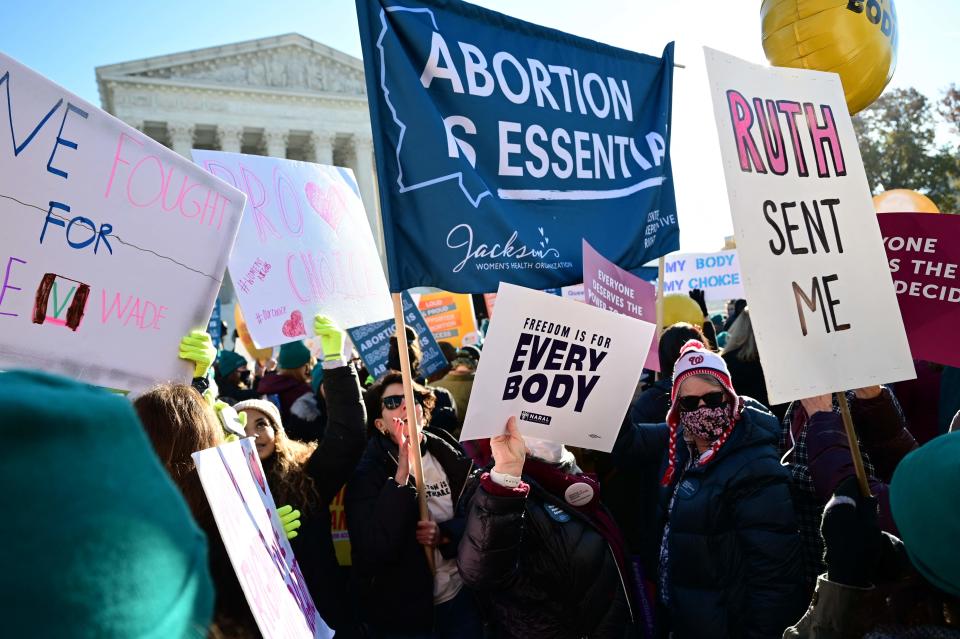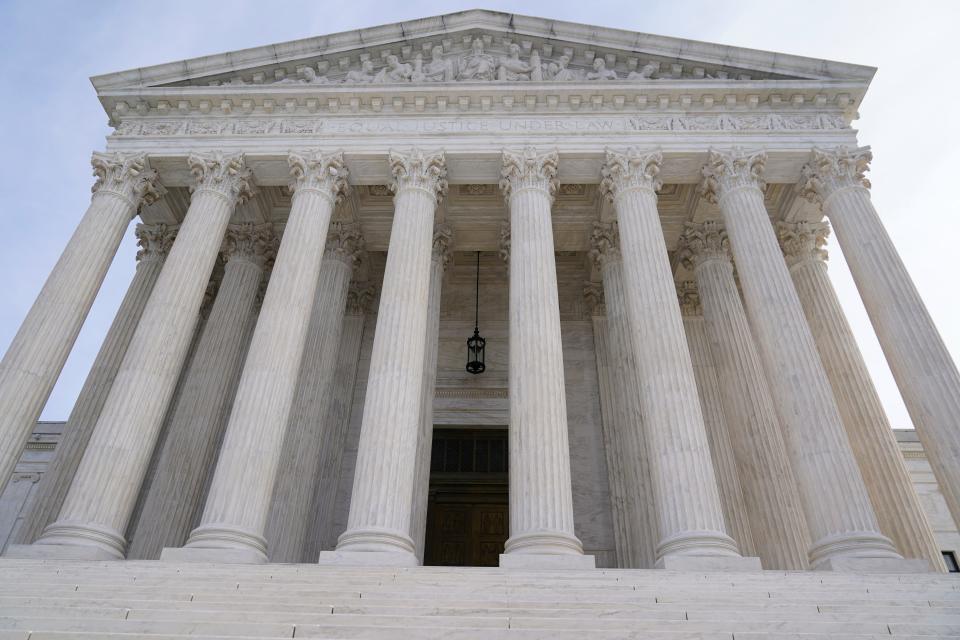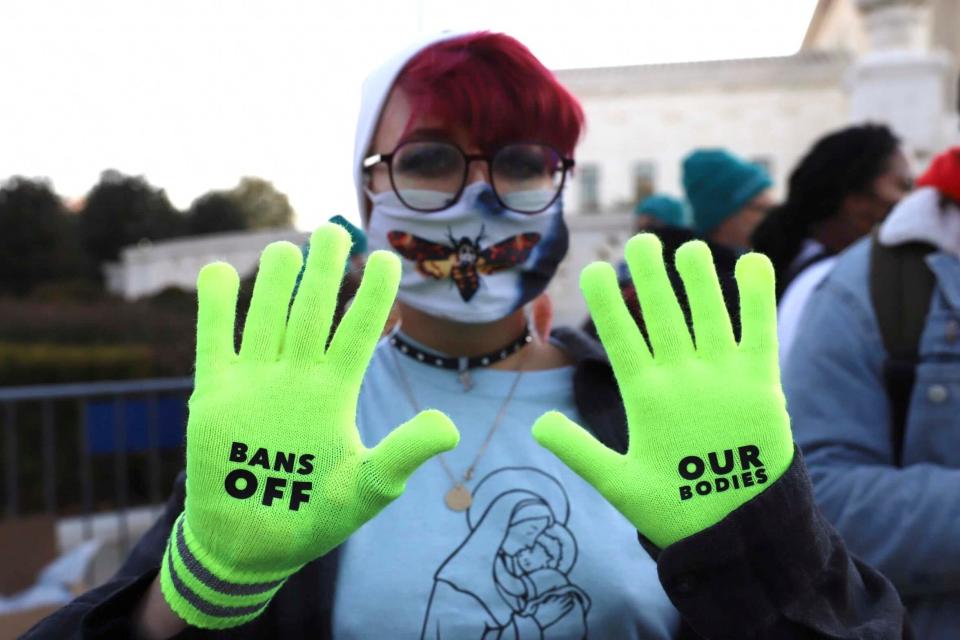After Roe? Pro- and anti-abortion rights groups face new landscape in 2022 midterms – and beyond
WASHINGTON – Advocates who support and those who oppose abortion rights aren't waiting around for a new Supreme Court ruling on the subject.
They're already operating in a political world without Roe v. Wade.
Organizations are spending more and revamping campaign strategies for voter turnout and candidate support for the midterm elections, assuming the U.S. Supreme Court will soon overturn the landmark abortion rights case.
If the high court indeed creates a post-Roe world – a ruling is expected by late June – states could further restrict or possibly ban abortions. That sets up elections with stakes that haven't been seen for a half-century.
"It is an unprecedented turning point in the history of reproductive freedom," said Jenny Lawson, vice president of organizing and electoral campaigns at Planned Parenthood Action Fund.
Abortion rights supporters say a backlash against the elimination of Roe will jet-fuel Democratic candidates across the country. Anti-abortion organizations say the prospect of electing lawmakers who could actually eliminate abortion would only increase their turnout. Both sides plan to spend millions this year to prove their predictions right.
Abortion: Four clues the Supreme Court is heading toward a major shift on Roe v. Wade
What's next for abortion access: If Roe v. Wade is overruled, here's how access to abortion could be affected in your state
"The pro-life movement has waited almost 50 years for this particular moment," said Marjorie Dannenfelser, president of the Susan B. Anthony List, which backs anti-abortion candidates. "This is the definition of intensity."
Supreme Court will weigh in
The "pro-choice" and "pro-life" movements don't agree on much, but members in both camps believe the Supreme Court will in some away allow states to increase restrictions on abortions this year.
They cited comments from conservative justices during a Dec. 1 hearing on the case the court is deciding: the constitutionality of a Mississippi law that bans most abortions after 15 weeks of pregnancy.

The high court will likely use the Mississippi case to revisit the 1973 ruling in Roe v. Wade, which forbids states from banning abortions before the point at which a fetus could survive outside the womb, at about 23 or 24 weeks. A majority of justices could overturn Roe entirely, or the court could uphold Mississippi's 15-week ban and forbid other states from banning abortions earlier than that, essentially a semi-reversal of Roe.
Abortion rights activists fear the worst, given the still-new ideological makeup of the Supreme Court. Conservative jurists, including critics of the Roe ruling, enjoy a 6-3 advantage because of the addition of three justices appointed by President Donald Trump: Neil Gorsuch, Brett Kavanaugh and Amy Coney Barrett.
Abortion rights supporters have used the threat of a Roe reversal in recent elections with mixed results. This year, they are already campaigning on the real thing.
"We're starting now," Lawson said. "We want to make sure folks know what's at stake."

The post-Roe world: Anti-abortion groups
While many abortion organizations will be involved in this year's elections, two groups, one on each side, are leading the battle: Planned Parenthood and the Susan B. Anthony List.
The Susan B. Anthony List and its affiliates have budgeted $72 million for the entire 2021-22 election cycle to support anti-abortion candidates. Two years ago, the Anthony organization spent up to $52 million in the 2020 election cycle as Trump sought reelection.
This time around, with state and congressional races on ballots across the country, anti-abortion organizations will spend more money and campaign harder to deliver a unique message: Lawmakers really can eliminate abortion. Their plans include stepped-up digital and television ads, mailers, door knocking and turnout operations designed to get activists and their friends to cast ballots.
The Susan B. Anthony List is focusing on six "battleground states," all of which feature competitive U.S. Senate races: Arizona, Georgia, Pennsylvania, Wisconsin, Florida and North Carolina. The parties in many of these states also are battling for control of state legislatures, some of which are poised to pass new laws if Roe v. Wade becomes invalid.
And, of course, the group plans to be busy the day the court hands down its ruling in the Mississippi case.
"It's important that we be ready," Dannenfelser said.

State actions: Pro-abortion groups
Abortion rights supporters say they are also invested in several gubernatorial races, describing state governors as "backstops" who can veto adverse legislation. Some cited governor's races in red states like Kansas and Georgia and more blue states like Minnesota.
The Guttmacher Institute, a reproductive health care research organization, reported that up to "26 states are certain or likely to ban abortion without Roe."
Officials with Planned Parenthood, which spent up to $45 million during the 2020 presidential election cycle, said they are still developing a campaign budget for the midterms. Lawson said "it will be our largest midterm ever" to meet what she called "a galvanizing moment" in the abortion debate.
'They could overturn Roe':Supreme Court to hear argument in blockbuster Mississippi abortion case
Roe v. Wade:Sarah Weddington, lawyer who argued Roe v. Wade, dies at 76
Their targets also include Democratic-leaning states that want to expand access to abortion, in part to accommodate women from other states where the practice might become more restrictive.
Kristin Ford, vice president of communications and research at NARAL Pro-Choice America, said it was a bad sign that the Supreme Court even took up the Mississippi case. She is not confident the Supreme Court will maintain Roe v. Wade, so advocates have to be ready now to tell voters what it means.
"Half the country could lose access to abortion care pretty quickly," Ford said. "There's a lot on the line."

Who benefits? It depends
Some say the real question is how much leeway the high court will give states to restrict abortion.
More than nine months before Election Day, they said, it's still too early to assess which party will benefit the most, politically, in a world without Roe.
Most states are either solidly Democratic or solidly Republican, and the turbocharged politics of abortion won't make much difference in elections there.
It's hard to imagine big blue states like California or New York ever passing abortion restrictions; red states like Alabama and Mississippi are likely to have conservative legislatures, regardless of any backlash to the elimination of Roe.
It is in the closely contested states that a reversal of Roe could make a difference, analysts said.
Abortion rights supporters cite polls showing that voters generally support the Roe v. Wade ruling and oppose the idea of banning abortions entirely. They predicted that eliminating Roe will generate a backlash that will propel Democratic candidates across the country.
"Voters will be really agitated," Ford said.
Anti-abortion groups cite other polls saying voters oppose lawmakers who believe there should be no restrictions on abortion whatsoever.

These voters have expressed frustration in the past because, after years of voting for ant-abortion lawmakers, courts continued to uphold Roe v. Wade, said Carol Tobias, president of the National Right To Life Committee.
If the court overturns Roe, those voters will be "pretty excited" to turn out, Tobias said: "People will feel like their vote will be more important than it has been in previous years."
Mary Ziegler, a law professor at Florida State University who has written on abortion, said the politics of a post-Roe world are "really unpredictable" because there are so many other variables in so many races.
A visiting professor at Harvard Law School this year, Ziegler compared such a ruling to a falling domino that would knock down a line of other dominoes as states and perhaps Congress adopt new abortion laws and change the political dynamic yet again.
It all depends on what states and voters do, she said. "There are a lot of dominoes here."
This article originally appeared on USA TODAY: Abortion: A post-Roe landscape taking shape ahead of SCOTUS ruling

 Yahoo Movies
Yahoo Movies 